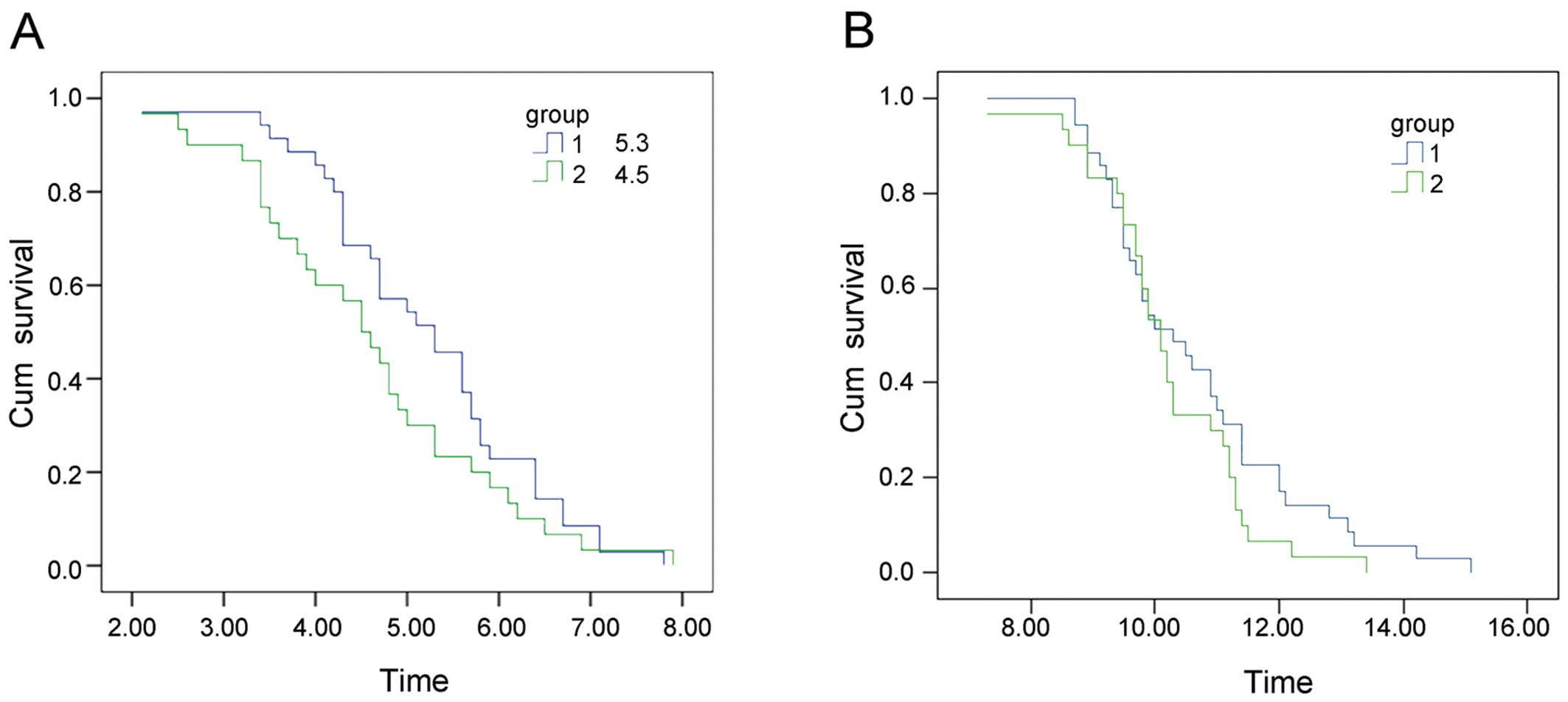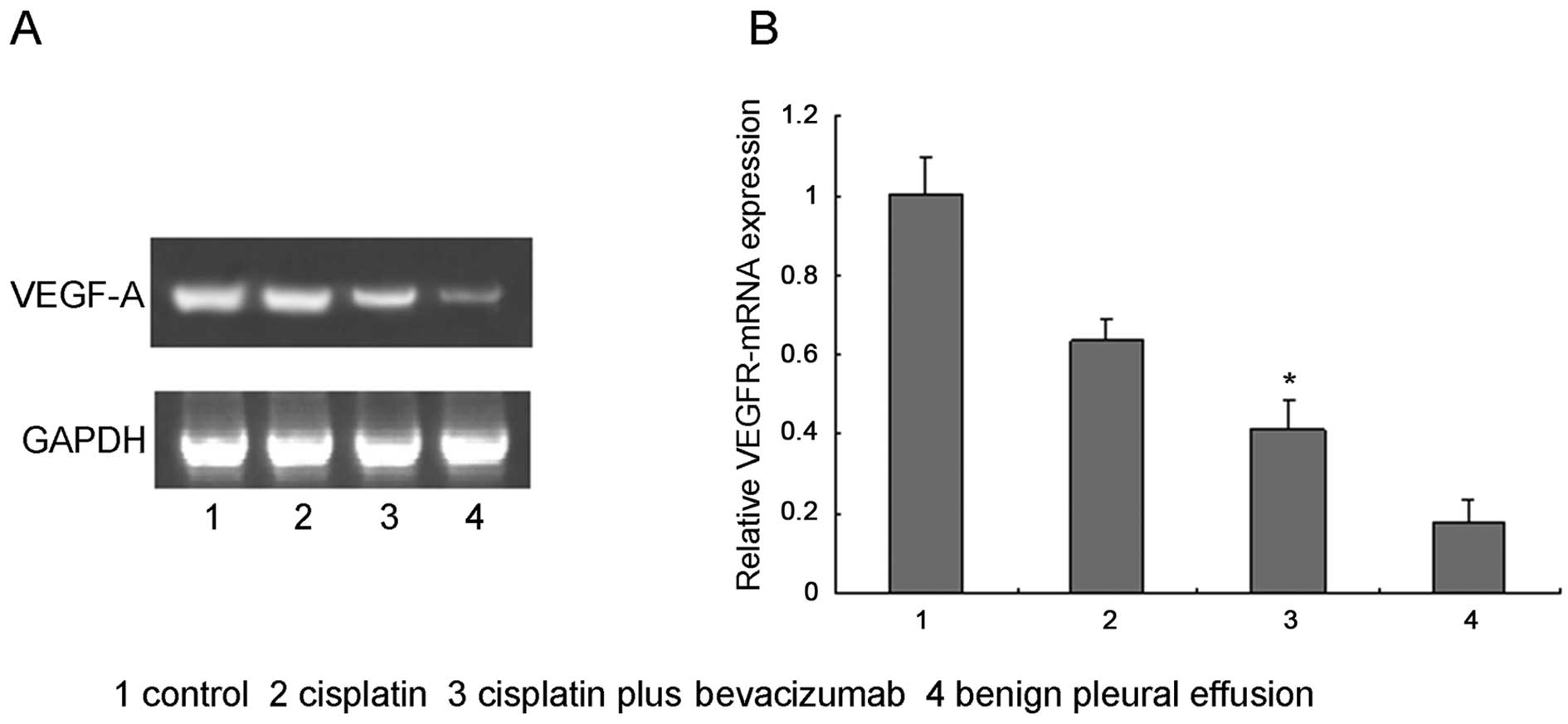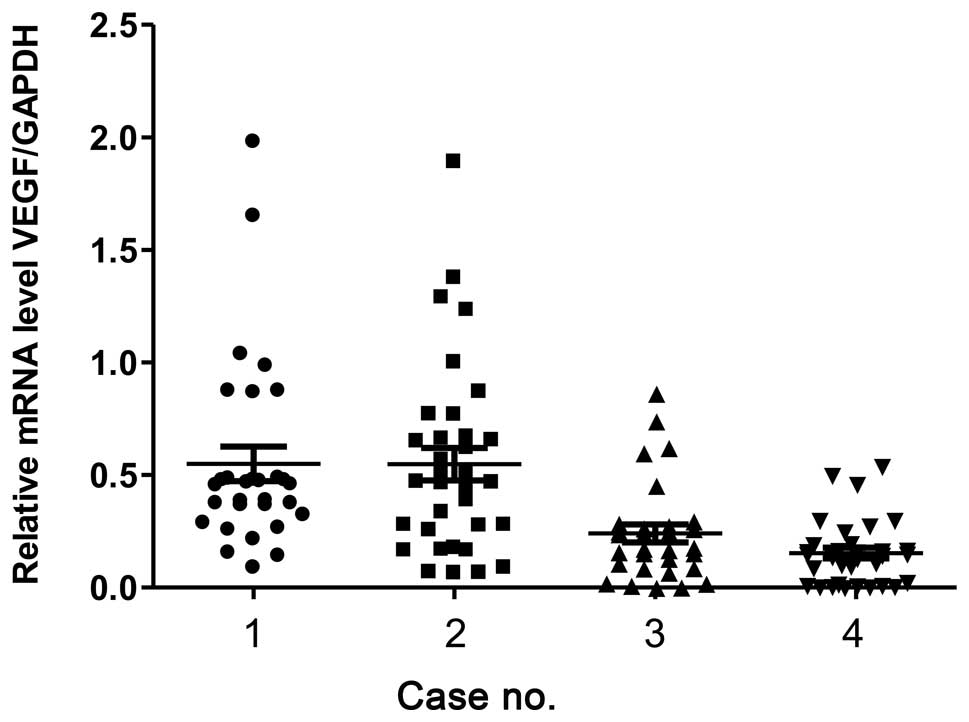|
1
|
Sanz N, Aguado P, de Agustin JC, et al:
Parapneumonic effussion. A review of 33 cases over 6 years. Cir
Pediatr. 18:77–82. 2005.(In Spanish).
|
|
2
|
Ramalingam S and Belani C: Systemic
chemotherapy for advanced non-small cell lung cancer: recent
advances and future directions. Oncologist. 13(Suppl 1): 5–13.
2008. View Article : Google Scholar : PubMed/NCBI
|
|
3
|
Masuno T, Kishimoto S, Ogura T, et al: A
comparative trial of LC9018 plus doxorubicin and doxorubicin alone
for the treatment of malignant pleural effusion secondary to lung
cancer. Cancer. 68:1495–1500. 1991. View Article : Google Scholar : PubMed/NCBI
|
|
4
|
Rusch VW, Figlin R, Godwin D and
Piantadosi S: Intrapleural cisplatin and cytarabine in the
management of malignant pleural effusions: a Lung Cancer Study
Group trial. J Clin Oncol. 9:313–319. 1991.PubMed/NCBI
|
|
5
|
Luh KT, Yang PC, Kuo SH, Chang DB, Yu CJ
and Lee LN: Comparison of OK-432 and mitomycin C pleurodesis for
malignant pleural effusion caused by lung cancer. A randomized
trial. Cancer. 69:674–679. 1992. View Article : Google Scholar : PubMed/NCBI
|
|
6
|
Tohda Y, Iwanaga T, Takada M, et al:
Intrapleural administration of cisplatin and etoposide to treat
malignant pleural effusions in patients with non-small cell lung
cancer. Chemotherapy. 45:197–204. 1999. View Article : Google Scholar : PubMed/NCBI
|
|
7
|
Ishida A, Miyazawa T, Miyazu Y, et al:
Intrapleural cisplatin and OK432 therapy for malignant pleural
effusion caused by non-small cell lung cancer. Respirology.
11:90–97. 2006. View Article : Google Scholar : PubMed/NCBI
|
|
8
|
Senger DR, Galli SJ, Dvorak AM, Perruzzi
CA, Harvey VS and Dvorak HF: Tumor cells secrete a vascular
permeability factor that promotes accumulation of ascites fluid.
Science. 219:983–985. 1983. View Article : Google Scholar
|
|
9
|
Fontanini G, Faviana P, Lucchi M, et al: A
high vascular count and overexpression of vascular endothelial
growth factor are associated with unfavourable prognosis in
operated small cell lung carcinoma. Br J Cancer. 86:558–563. 2002.
View Article : Google Scholar : PubMed/NCBI
|
|
10
|
Sack U, Hoffmann M, Zhao XJ, et al:
Vascular endothelial growth factor in pleural effusions of
different origin. Eur Respir J. 25:600–604. 2005. View Article : Google Scholar : PubMed/NCBI
|
|
11
|
Kobold S, Hegewisch-Becker S, Oechsle K,
Jordan K, Bokemeyer C and Atanackovic D: Intraperitoneal VEGF
inhibition using bevacizumab: a potential approach for the
symptomatic treatment of malignant ascites? Oncologist.
14:1242–1251. 2009. View Article : Google Scholar : PubMed/NCBI
|
|
12
|
Ferrara N, Gerber HP and LeCouter J: The
biology of VEGF and its receptors. Nat Med. 9:669–676. 2003.
View Article : Google Scholar : PubMed/NCBI
|
|
13
|
Pichelmayer O, Zielinski C and Raderer M:
Response of a nonmalignant pleural effusion to bevacizumab. N Engl
J Med. 353:740–741. 2005. View Article : Google Scholar : PubMed/NCBI
|
|
14
|
Neragi-Miandoab S: Malignant pleural
effusion, current and evolving approaches for its diagnosis and
management. Lung Cancer. 54:1–9. 2006. View Article : Google Scholar : PubMed/NCBI
|
|
15
|
Cohen MH, Gootenberg J, Keegan P and
Pazdur R: FDA drug approval summary: bevacizumab (Avastin) plus
Carboplatin and Paclitaxel as first-line treatment of
advanced/metastatic recurrent nonsquamous non-small cell lung
cancer. Oncologist. 12:713–718. 2007. View Article : Google Scholar : PubMed/NCBI
|
|
16
|
Ribeiro SC, Vargas FS, Antonangelo L, et
al: Monoclonal anti-vascular endothelial growth factor antibody
reduces fluid volume in an experimental model of inflammatory
pleural effusion. Respirology. 14:1188–1193. 2009.
|
|
17
|
Teixeira LR, Vargas FS, Acencio MM, et al:
Blockage of vascular endothelial growth factor (VEGF) reduces
experimental pleurodesis. Lung Cancer. 74:392–395. 2011. View Article : Google Scholar : PubMed/NCBI
|
|
18
|
Pichelmayer O, Gruenberger B, Zielinski C
and Raderer M: Bevacizumab is active in malignant effusion. Ann
Oncol. 17:18532006. View Article : Google Scholar : PubMed/NCBI
|
|
19
|
Sahn SA: Management of malignant pleural
effusions. Monaldi Arch Chest Dis. 56:394–399. 2001.PubMed/NCBI
|
|
20
|
Musani AI: Treatment options for malignant
pleural effusion. Curr Opin Pulm Med. 15:380–387. 2009. View Article : Google Scholar : PubMed/NCBI
|
|
21
|
Los G, Mutsaers PH, van der Vijgh WJ,
Baldew GS, de Graaf PW and McVie JG: Direct diffusion of
cis-diamminedichloroplatinum(II) in intraperitoneal rat tumors
after intraperitoneal chemotherapy: a comparison with systemic
chemotherapy. Cancer Res. 49:3380–3384. 1989.PubMed/NCBI
|
|
22
|
Walker-Renard PB, Vaughan LM and Sahn SA:
Chemical pleurodesis for malignant pleural effusions. Ann Intern
Med. 120:56–64. 1994. View Article : Google Scholar : PubMed/NCBI
|
|
23
|
Aslam N and Marino CR: Malignant ascites:
new concepts in pathophysiology, diagnosis, and management. Arch
Intern Med. 161:2733–2737. 2001. View Article : Google Scholar : PubMed/NCBI
|
|
24
|
Grove CS and Lee YC: Vascular endothelial
growth factor: the key mediator in pleural effusion formation. Curr
Opin Pulm Med. 8:294–301. 2002. View Article : Google Scholar : PubMed/NCBI
|
|
25
|
Patane S, Marte F, Di Bella G and Davi M:
Pericardial effusion with elevated serum carbohydrate antigen 125
levels and ovarian tumor mass. Int J Cardiol. 127:e105–e107. 2008.
View Article : Google Scholar : PubMed/NCBI
|
|
26
|
Yokoyama T, Tanaka A, Kato S and Aizawa H:
Multiple myeloma presenting initially with pleural effusion and a
unique paraspinal tumor in the thorax. Intern Med. 47:1917–1920.
2008. View Article : Google Scholar : PubMed/NCBI
|
|
27
|
Chen Y, Liang B, Zhao YJ, Wang SC, Fan YB
and Wu GP: Transcription expression and clinical significance of
vascular endothelial growth factor mRNA and endostatin mRNA in
pleural effusions of patients with lung cancer. Diagn Cytopathol.
40:287–291. 2012. View
Article : Google Scholar : PubMed/NCBI
|
|
28
|
Folkman J, Merler E, Abernathy C and
Williams G: Isolation of a tumor factor responsible for
angiogenesis. J Exp Med. 133:275–288. 1971. View Article : Google Scholar : PubMed/NCBI
|
|
29
|
Mohammed KA, Nasreen N, Hardwick J, Logie
CS, Patterson CE and Antony VB: Bacterial induction of pleural
mesothelial monolayer barrier dysfunction. Am J Physiol Lung Cell
Mol Physiol. 281:L119–L125. 2001.PubMed/NCBI
|
|
30
|
Folkman J: Tumor angiogenesis and tissue
factor. Nat Med. 2:167–168. 1996. View Article : Google Scholar
|
|
31
|
Zebrowski BK, Yano S, Liu W, et al:
Vascular endothelial growth factor levels and induction of
permeability in malignant pleural effusions. Clin Cancer Res.
5:3364–3368. 1999.PubMed/NCBI
|
|
32
|
Strizzi L, Catalano A, Vianale G, et al:
Vascular endothelial growth factor is an autocrine growth factor in
human malignant mesothelioma. J Pathol. 193:468–475. 2001.
View Article : Google Scholar : PubMed/NCBI
|
|
33
|
Presta LG, Chen H, O’Connor SJ, et al:
Humanization of an anti-vascular endothelial growth factor
monoclonal antibody for the therapy of solid tumors and other
disorders. Cancer Res. 57:4593–4599. 1997.PubMed/NCBI
|
|
34
|
Shaheen RM, Tseng WW, Vellagas R, et al:
Effects of an antibody to vascular endothelial growth factor
receptor-2 on survival, tumor vascularity, and apoptosis in a
murine model of colon carcinomatosis. Int J Oncol. 18:221–226.
2001.
|
|
35
|
Hama M, Komatsu Y and Hachiya T: A case of
lung cancer showing marked reduction of pleural effusion by
bevacizumab in combination with carboplatin and paclitaxel. Gan To
Kagaku Ryoho. 38:1877–1879. 2011.(In Japanese).
|
|
36
|
Numnum TM, Rocconi RP, Whitworth J and
Barnes MN: The use of bevacizumab to palliate symptomatic ascites
in patients with refractory ovarian carcinoma. Gynecol Oncol.
102:425–428. 2006. View Article : Google Scholar : PubMed/NCBI
|
|
37
|
Hamilton CA, Maxwell GL, Chernofsky MR,
Bernstein SA, Farley JH and Rose GS: Intraperitoneal bevacizumab
for the palliation of malignant ascites in refractory ovarian
cancer. Gynecol Oncol. 111:530–532. 2008. View Article : Google Scholar : PubMed/NCBI
|
|
38
|
Kesterson JP, Mhawech-Fauceglia P and Lele
S: The use of bevacizumab in refractory ovarian granulosa-cell
carcinoma with symptomatic relief of ascites: a case report.
Gynecol Oncol. 111:527–529. 2008. View Article : Google Scholar : PubMed/NCBI
|
|
39
|
Volm M, Koomagi R and Mattern J:
Prognostic value of vascular endothelial growth factor and its
receptor Flt-1 in squamous cell lung cancer. Int J Cancer.
74:64–68. 1997. View Article : Google Scholar : PubMed/NCBI
|
|
40
|
Kassim SK, El-Salahy EM, Fayed ST, et al:
Vascular endothelial growth factor and interleukin-8 are associated
with poor prognosis in epithelial ovarian cancer patients. Clin
Biochem. 37:363–369. 2004. View Article : Google Scholar : PubMed/NCBI
|
|
41
|
Kumar H, Heer K, Lee PW, et al:
Preoperative serum vascular endothelial growth factor can predict
stage in colorectal cancer. Clin Cancer Res. 4:1279–1285.
1998.PubMed/NCBI
|
|
42
|
Matsuyama W, Hashiguchi T, Mizoguchi A, et
al: Serum levels of vascular endothelial growth factor dependent on
the stage progression of lung cancer. Chest. 118:948–951. 2000.
View Article : Google Scholar : PubMed/NCBI
|
|
43
|
Cheng D, Rodriguez RM, Perkett EA, et al:
Vascular endothelial growth factor in pleural fluid. Chest.
116:760–765. 1999. View Article : Google Scholar : PubMed/NCBI
|
|
44
|
Kraft A, Weindel K, Ochs A, et al:
Vascular endothelial growth factor in the sera and effusions of
patients with malignant and nonmalignant disease. Cancer.
85:178–187. 1999. View Article : Google Scholar : PubMed/NCBI
|
|
45
|
Thickett DR, Armstrong L and Millar AB:
Vascular endothelial growth factor (VEGF) in inflammatory and
malignant pleural effusions. Thorax. 54:707–710. 1999. View Article : Google Scholar : PubMed/NCBI
|
|
46
|
Yanagawa H, Takeuchi E, Suzuki Y, Ohmoto
Y, Bando H and Sone S: Vascular endothelial growth factor in
malignant pleural effusion associated with lung cancer. Cancer
Immunol Immunother. 48:396–400. 1999. View Article : Google Scholar : PubMed/NCBI
|
|
47
|
Verheul HM, Hoekman K, Jorna AS, Smit EF
and Pinedo HM: Targeting vascular endothelial growth factor
blockade: ascites and pleural effusion formation. Oncologist.
5(Suppl 1): 45–50. 2000. View Article : Google Scholar : PubMed/NCBI
|
|
48
|
Ishimoto O, Saijo Y, Narumi K, et al: High
level of vascular endothelial growth factor in hemorrhagic pleural
effusion of cancer. Oncology. 63:70–75. 2002. View Article : Google Scholar : PubMed/NCBI
|
|
49
|
Kishiro I, Kato S, Fuse D, Yoshida T,
Machida S and Kaneko N: Clinical significance of vascular
endothelial growth factor in patients with primary lung cancer.
Respirology. 7:93–98. 2002. View Article : Google Scholar : PubMed/NCBI
|
|
50
|
Momi H, Matsuyama W, Inoue K, et al:
Vascular endothelial growth factor and proinflammatory cytokines in
pleural effusions. Respir Med. 96:817–822. 2002. View Article : Google Scholar : PubMed/NCBI
|
|
51
|
Harlozinska A, Sedlaczek P, Kulpa J, et
al: Vascular endothelial growth factor (VEGF) concentration in sera
and tumor effusions from patients with ovarian carcinoma.
Anticancer Res. 24:1149–1157. 2004.PubMed/NCBI
|
|
52
|
Rudlowski C, Pickart AK, Fuhljahn C, et
al: Prognostic significance of vascular endothelial growth factor
expression in ovarian cancer patients: a long-term follow-up. Int J
Gynecol Cancer. 16(Suppl 1): 183–189. 2006. View Article : Google Scholar : PubMed/NCBI
|
|
53
|
Watanabe M, Boyer JL and Crystal RG:
AAVrh.10-mediated genetic delivery of bevacizumab to the pleura to
provide local anti-VEGF to suppress growth of metastatic lung
tumors. Gene Ther. 17:1042–1051. 2010. View Article : Google Scholar : PubMed/NCBI
|
|
54
|
Konner JA, Grabon DM, Gerst SR, et al:
Phase II study of intraperitoneal paclitaxel plus cisplatin and
intravenous paclitaxel plus bevacizumab as adjuvant treatment of
optimal stage II/III epithelial ovarian cancer. J Clin Oncol.
29:4662–4668. 2011. View Article : Google Scholar
|


















